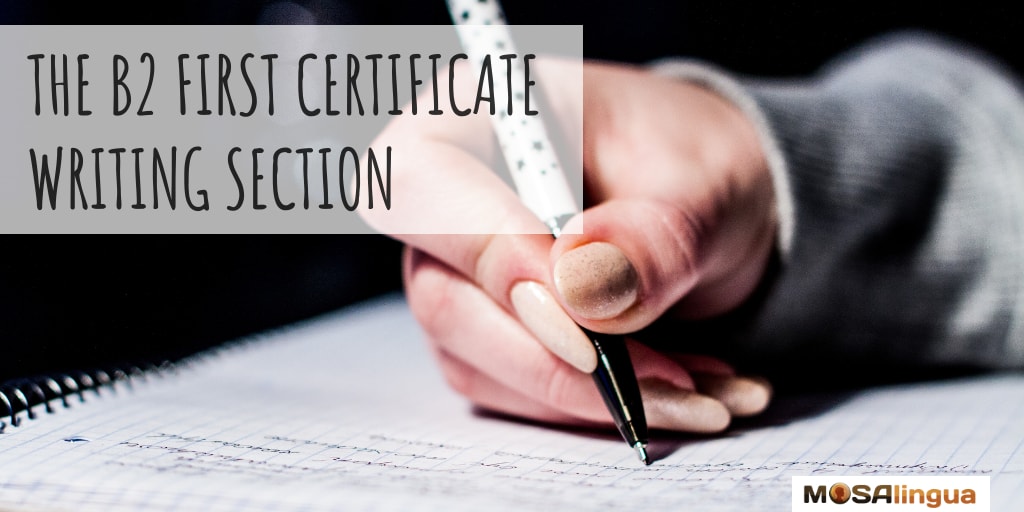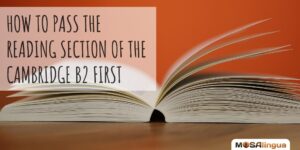If you’re planning to take the Cambridge B2 First Certificate, it’s important to familiarize yourself with how the exam is structured and the required techniques to pass it. The Cambridge First writing section can be tricky, so we’ve put together the top tricks and tips for getting your head around the exam.

What is the Cambridge First Writing Section?
If you’re planning on sitting the Cambridge B2 First Certificate exam, the very first thing you need to do is check out the information on the B2 Certificate in general. The test is comprised of 4 separate parts: reading, writing, listening, and speaking.
The Cambridge B2 First writing section requires you to produce two different pieces of writing, in two different formats. The writing exam is the longest section of the exam, so it’s worth paying attention to the specific details of this part.
Here are the most important things you need to know:
- Time allowed: 1 hour and 20 minutes
- Number of parts: 2 parts, each with one question
- Part 1: one compulsory question (140 to 190 words)
- Part 2: a choice of three questions (140 to 190 words)
- Purpose of the test: in the writing section, you should show your ability to write articles, emails, essays, letters, reports, and reviews.
Those are the basics of the exam layout. The two parts of the writing section are important to understand, so we have put together some extra, more detailed information on both sections below. But first, let’s talk about preparation.
How to Prepare for the Cambridge First Writing Section
Preparation is key for any exam. As they say, practice makes perfect! There is plenty you can do to prepare yourself for the Cambridge B2 First writing section, and here are our top tips.
Make the most of different resources
The Cambridge B2 First Certificate is a very prestigious exam. Luckily for you, that means there are a lot of resources which can help you to prepare for it. The main source for you will be Cambridge’s web pages with specifics about the exam. But here are a few more places you can find help:
- How to Pass the Cambridge B2 First Certificate – general information about the B2 First Certificate
- Cambridge’s example papers – Cambridge’s information section has downloadable exam papers
- Resources for English Learners – a super list of resources which can help you improve your English (there’s a whole section on writing tools)
- Choosing your Learning Tools – a handy video on how to choose the best learning tools
Plan your Time
Planning will be a big part of success in the Cambridge B2 First writing section. You should plan your study time, and also plan your time during the test itself.
Start by planning out some revision time. This doesn’t mean you have to set aside hours and hours for studying. You should try to complete some practice tests at home, but you can also fit other types of practice into small amounts of time throughout your day. In fact, Luca talks about finding the time to learn a language in this handy video. You can study on the train, before bed, or even on the toilet! Watch the video below to find out how:
Hey, by the way, have you subscribed to our channel? If not, do it now (click here)! You won’t want to miss the new language tips and facts we post every week.
Next, make sure you time yourself when you practice writing the essays at home. You have a total of 1 hour and 20 minutes (80 minutes) for the Cambridge B2 First writing section. That means you have 40 minutes for each part. When you are practicing, try to stick to these limits. At first, it might take you a lot longer to complete the tasks, and that’s OK. The more you practice, the easier it will be to complete the tasks in the right amount of time.
When you practice at home, always write essays by hand and with a pen. This will give you an idea of how much you can write in the allocated time, and will help you get used to writing by hand.
The Two Parts of the Cambridge First Writing Section
Part 1: Essay
In part 1, you will be given an essay title and two ideas linked to the title. You will then need to write an essay which explains your own opinions about the topic, using the two ideas you have been given. You will also need to add a third, different idea of your own.
The question
You won’t need any specialized knowledge for this part of the exam, because the title of the essay will be a question of “general interest.” For example, the sample paper that Cambridge provides on its website uses the question: “Every country in the world has problems with pollution and damage to the environment. Do you think these problems can be solved?” As you can see, you don’t need to be an expert to answer this question. It’s a topic that you might have already discussed in your life.
The question you will be given will be formatted in one of the following ways:
- Problem/solution (cause and effect of a situation). In this case, you must describe the problem, its effects and solutions, and the possible outcomes.
- Opinion (whether you agree with the theme given or not). In this case, present your position and arguments that support it.
- Discussion (advantages and disadvantages of a certain situation). Present your position on the given theme, and then provide arguments from the opposite viewpoint.
Structuring part 1 of the Cambridge B2 First writing section
- Plan: Before you begin your essay, take about three minutes to write out an essay plan, taking into account the two ideas they provide. Don’t forget to come up with a third idea of your own. Identify where you stand and jot down several arguments that support it. Avoid using informal language or terms you’ve never used.
- Introduction: Here, you you should explain your point of view, and provide context (e.g. why this subject is important with respect to a certain issue).
- Body: Develop each argument in paragraphs, always making sure you clearly express how each one answers the question/supports your point of view.
- Conclusion: Recap the main arguments as proof of your point of view/argument, but do not add any other arguments or new ideas.
Part 2: Situationally Based Writing Task
For part 2, you will be asked to write a text from a choice of text types. These can include articles, emails/letters, reports, or reviews. You’ll be given information about the context, topic, purpose and target reader to help you.
The question
Like in part 1, you won’t need any specialized knowledge to answer this question. The questions will be based on knowledge you already have. For example, if there is an option to write a review, you might be asked to write about a character from a book of your choice. This means that you can choose any book you have read, as long as you have a good knowledge of that book.
Structuring part 2 of the Cambridge First writing section
Remember that the language and structure of your writing will need to be suitable for the option you choose. You will have to write differently if it is an article than if it is a book review or an email, because of your target reader. To practice this skill, try looking at an example of each type of text from the internet, and see if you can spot the differences in language and structure.
- If you are writing an article, you can present facts and your point of view. In order to do this, you must express your ideas clearly and articulately. You should not address the reader directly.
- For a review, you might need to analyze characters in a book, the main plot, or the setting. Again, do not address the reader directly.
- In an email, postcard, or letter, you will need to use key phrases for greetings and farewells, as well as the formatting conventions for these types of text. You should address one specific reader personally.
After the exam
It’s always useful to know how your exam will be assessed, no matter what type of test you are taking. Getting familiar with the scoring criteria is a useful way to make sure that you are ticking all the boxes during the exam. So how is your Cambridge B2 First writing section assessed?
There are four assessment criteria for the writing tasks: content, communicative achievement, organization and language. Here’s what they include:
- Content focuses on how well you have completed the task. This means that the person marking your exam will check if you have done what you were asked to do, and if you have answered the question.
- Communicative achievement focuses on how appropriate the writing is for the task. For example, is the style suitable for a book review? This will include whether you have used the right register, for example formal or informal.
- Organization looks at the way you structure the piece of writing. The examiner will check if it’s logical and ordered.
- Language focuses on vocabulary and grammar. This includes the range of vocabulary you use, and how accurate it is.
So now you’re all set! Remember the most important rule though: learning should be fun! The Cambridge B2 First Certificate is a very official exam, but you should still enjoy yourself while you are practicing. We hope that when you decide you are ready to take the exam, you feel prepared and achieve the result you’re hoping for.
For other tips and tricks to get the most of your language learning, follow us on Facebook and Instagram! If you have any tricks of your own for exam-takers, let us know in the comments section.







Comments